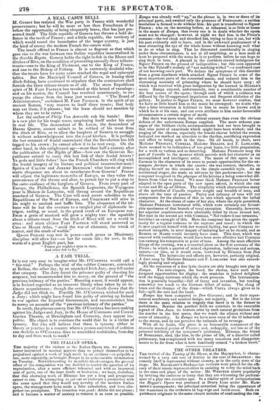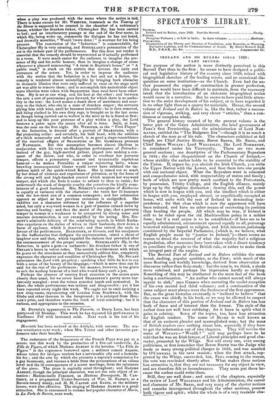THE OTHER THEATRES.
Tax revival of the Taming of the Shrew, at the Haymarket, is charac- terized by a very odd sort of fidelity to the text of SHAKSPERE : the comedy itself is represented without scenery, as in the early state of the stage. Mr. MACREADY'S Shaksperian revivals were prized for the effi- cacy of their scenic representations in assisting to carry the mind back- to the time and place of the action : Mr. WEBSTER courts popularity by inviting the audience to fancy that they are witnessing the perform- ance of a play two centuries ago. In a similar spirit of antiquarianism the Beggar's Opera was produced at Drury Lane under Mr. ilAltf6- MOND'S management ; the principal attraction being the appearance of the musicians in the orchestra in bag-wigs and laced-coats. Both ex perimeras originate in the same absurd mistake of confounding the tins when ai play was produced with the scene where the action is laid. There is some excuse for Mr. WEBSTER, inasmuch as the Taming of the Shrew is supposed to be enacted in the chamber of a nobleman's house, whither the drunken tinker, Christopher Sly, has been carried to bed; and an interlocutory passage at the end of the first scene, in which Sly, being woke up, commends the dialogue he has not heard, and drowsily mumbles, '• Would 'twere done !" is warrant for his being present. The restoration of the "Induction" is commendable, for Christopher Sly is very amusing, and STRICKLAND'S personation of the sot is the richest part of the performance. But this does not render it essential that the comedy should be represented as if actually performed in a room. It were much easier for the audience to imagine the pre- sence of Sly and his noble hoaxer, than to imagine a change of scene whenever a placard announcing " A room in Baptista's house," or " A public road," is stuck on the curtain that screens the exits and entrances of the actors. Yet, in order to impress the audience with the notion that the Induction is a fact and not a fiction, the comedy is rendered almost nuiutelligible by bringing back obstacles to dramatic illusion that were only suffered to exist on the stage until art was able to remove them ; and to accomplish this undesirable object more liberties were taken with SHARSPERE than need have been other- wise. Sly is set at one wing, and his host at the other ; and between the acts a sort of pantomime goes forward, for which there is no autho- rity in the text : the Lord makes a dumb show of merriment and cour- tesy to the tinker, who sits in a state of drunken stupor ; the servants plying him with wine, until he becomes insensible; he is then removed, and being clothed in his own dirty rags, is brought on in the last scene as though being carried out to wallow in the mire as be is found at first : and to keep up this poor pretence of a play within a play, the Lord bestows a purse upon the actors after all is done. Such, at least, was the case on the first night. Mr. WEBSTER, as the " First Player" in the Induction, is dressed after a portrait of SHAESPERE, with a flat projecting collar: and certainly, his bald head, with the addition of a thick moustache and tufted beard, is as good a stage-resemblance of the received effigies of SHARSPERE as Mr. GOMERSAL presents of NAPOLEON. But this assumption becomes almost libelous in conjunction with his very un-Shaksperian performance of Petruchio : instead of the gay, high-mettled gallant, piqued into making a con- quest of the shrew, and who, in order to overbear her perverse temper, affects a peremptory manner and tyrannically capricious humour — he makes Petruchio a vulgar roystering bully, whose brawling inconsequential bluster would never have subdued the im- perious spirit of the quick-witted Kate. She is ,tamed not so much by her dread of violence and experience of privation, as by the force of the strong will and high-handed control which masters her wayward temper, and which she finds it easier to submit to than to resist; for underneath the mask of despotic cruelty she perceives the kindly coun- tenance of a good husband. Mrs. NISBETT'S conception of Katharine is equally at variance with the character : she vents her ill-humours with the low-bred airs of a common termagant ; and her submission appears as abject as her previous resistance is undignified. She exhibits not a character reformed by the influence of a superior mind, but only a wayward woman in a gust of passion calmed down by starving and beating : and thus the moral of the play, that a perverse temper in woman is a weakness to be conquered by strong sense and resolute determination, is not exemplified by the acting. Mrs. Nis- BETT's admirable delivery of the concluding speech, in which Katha- rine expatiates on the duties of wives to their husbands, drew down a burst of applause, which it deserved ; and thus turned the scale in favour of the performance. BUCESTONE, as Grumio, and his coadjutors in the buffooneries that disfigure the representation, raised a shout of laughter now and then, which beguiled the dulness that prevailed after the commencement of the proper comedy. STRICRLAND'S Sly, in the Induction, is quite a gem—a carbuncle: his drunken tinker is one of OSTADE'S boors in velvet robes. The sottish bewilderment with which he gazes on the attendants as they successively address him, completely expresses the character and condition of Christopher Sly. Mr. STUART personates the Lord with propriety ; speaking what little he has to say with a sense of the beauty of the language,—which is more than can be said for the rest of the performers : his manner, however, is too grave to suit the madcap humour of a lord who would fancy such a jest.
Perhaps the absence of scenery fixed attention on the actors more closely than usual, for we never heard SHARSPERE'S poetry more bar- barously mangled: even the voices sounded harsh and unmusical. In short, the whole performance was tedious and disagreeable : yet it has been repeated every night this week. We ought not to omit noticing a new drop-scene, representing old London from Southwark, with the Globe and other theatres in the foreground: it is enlarged from Hon- x.s.a's print, and therefore wants the truth of local colouring; but it is curious, and appropriate to the occasion.



























 Previous page
Previous page